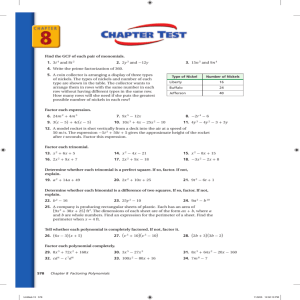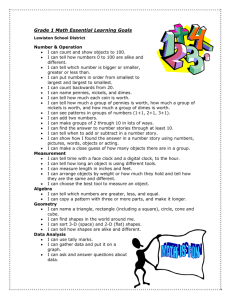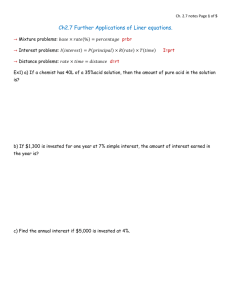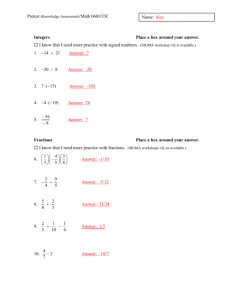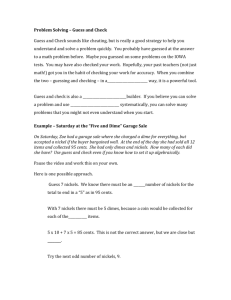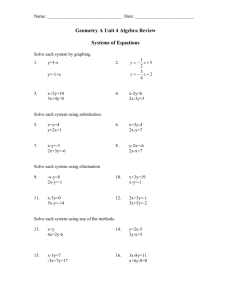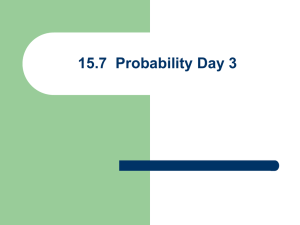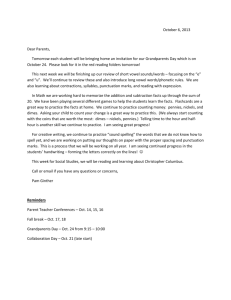Nickels for Know-How Makes Good Sense! And so much more...
advertisement
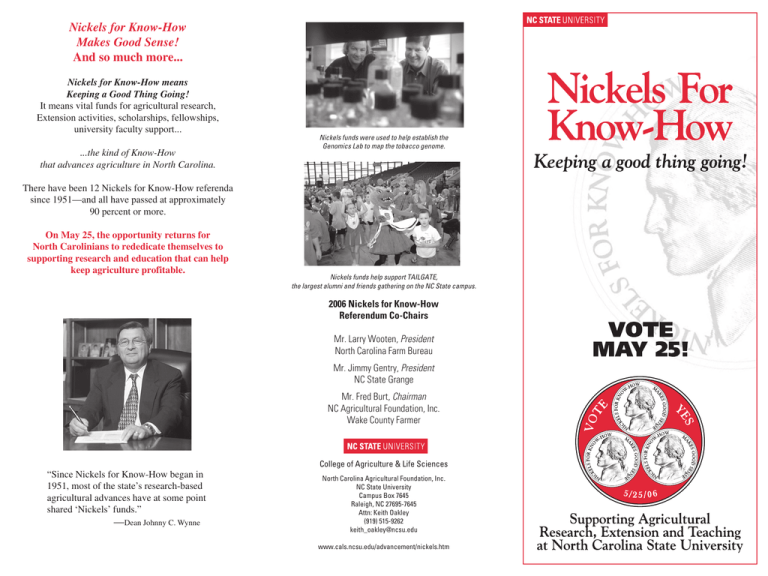
Nickels for Know-How Makes Good Sense! And so much more... Nickels for Know-How means Keeping a Good Thing Going! It means vital funds for agricultural research, Extension activities, scholarships, fellowships, university faculty support... ...the kind of Know-How that advances agriculture in North Carolina. Nickels funds were used to help establish the Genomics Lab to map the tobacco genome. There have been 12 Nickels for Know-How referenda since 1951—and all have passed at approximately 90 percent or more. On May 25, the opportunity returns for North Carolinians to rededicate themselves to supporting research and education that can help keep agriculture profitable. Nickels funds help support TAILGATE, the largest alumni and friends gathering on the NC State campus. 2006 Nickels for Know-How Referendum Co-Chairs Mr. Larry Wooten, President North Carolina Farm Bureau Mr. Jimmy Gentry, President NC State Grange Mr. Fred Burt, Chairman NC Agricultural Foundation, Inc. Wake County Farmer College of Agriculture & Life Sciences “Since Nickels for Know-How began in 1951, most of the state’s research-based agricultural advances have at some point shared ‘Nickels’ funds.” —Dean Johnny C. Wynne North Carolina Agricultural Foundation, Inc. NC State University Campus Box 7645 Raleigh, NC 27695-7645 Attn: Keith Oakley (919) 515-9262 keith_oakley@ncsu.edu www.cals.ncsu.edu/advancement/nickels.htm Nickels for Know-How Makes Good Sense! It’s a self-help program for farmers! Nickels for KnowHow is a 55-year-old voluntary assessment on feed and fertilizer produced and purchased in North Carolina. The money is collected and deposited with The North Carolina Agricultural Foundation, Inc., which uses the funds to support research, teaching and extension projects at NC State University. On May 25, voters will have the opportunity to renew this program and assess themselves three nickels for each ton of feed and fertilizer they purchase. The North Carolina Department of Agriculture collects the money from the manufacturers of feed and fertilizer. The manufacturers build the extra cost—three nickels per ton—into the price of their products. The yield: Nickels for Know-How now raises about $1,200,000 annually. That’s an average of $25 per farm. The Board of Directors of The NC Agricultural Foundation, Inc. decides how the money is spent. Based at NC State, the foundation includes farmer members from each county, as well as agribusiness leaders who approve each proposal for support from faculty at NC State. How it began: Farmers started Nickels for Know-How in a referendum held November 3, 1951. The General Assembly authorized a vote on this self-help program after it had been requested by the North Carolina Farm Bureau and the NC State Grange. Feed and fertilizer consumers have an opportunity every six years to decide if they wish to continue the program. The next referendum is Thursday, May 25, 2006 . If twothirds of the voters vote “yes” in the referendum, the Nickels for Know-How program will continue for another six years retroactive to January 1, 2006. The voters: All users of feed and fertilizer in North Carolina and family members. Numerous polling places will be established in each county, much like they are for commodity referenda. A list of polling places can be obtained from your county Cooperative Extension Service Center. Nickels for Know-How In Action! Nickels for Know-How provides support for fundraising efforts in the College of Agriculture and Life Sciences generating over $30 million annually in private contributions. This is a $75 return on every $1 dollar invested. In the current NC State “Achieve!” Campaign, Nickels has helped the College to raise almost $200 million in contributions towards our $275 million goal. Some of the entities Nickels provides operating support for include the NC Cooperative Extension Service Foundation, the NC 4-H Development Fund, the NC FFA Foundation, the NC Family & Consumer Sciences Foundation, the NC Dairy Foundation, the CALS Alumni & Friends Society, and the JC Raulston Arboretum Board of Directors. Nickels support has helped the College to raise funds for over 475 endowments valued at more than $100 million that provide over $800,000 in scholarships to 600 undergraduate students in the College each year. In addition, these endowments support faculty efforts, county extension programs, commodity research efforts, and other programs in CALS. Nickels helps the College by funding recognition events for outstanding volunteers, individual, corporate and foundation donors; current and retired faculty and staff (on and off campus); and legislators who have been especially supportive of efforts including the salary equity funding for Ag Programs (the NC Agricultural Research Service and NC Cooperative Extension Service) in the NC General Assembly this past year. The Annual TAILGATE (CALS Alumni & Friends Society Reunion), the “Food for Thought” and “Western Marketing” agricultural awareness campaigns, and the College’s Commodity Relations activities and programs are other examples of Nickels funding. Efforts to keep rural agricultural students at NC State through the “Spend a Day at State” program, the CALS Student Ambassadors Program, CALS Teaching and Advising Awards, Workshops for High School Vocational Agriculture Teachers, OnCampus Internships and Annual Scholarship Enhancement also are funded by Nickels. Since 1951, most of the state’s research-based agricultural advances have at some point shared Nickels funds. Some examples of those faculty-driven projects are as follows: • Switchgrass varieties as feedstock for bioethanol production • Avian Flu Education Program • The Academy for Excellence in Commodity Association Leadership • Maximizing profit in North Carolina peanuts. • Family & community disaster preparedness education. • Strengthening agricultural programming in 4-H through commodity groups. • Franklin County 2-day Educational Goat & Sheep Conference. • • • • • • • • • • • • • • • • • • • • • • • • • • • • • • • • • International competitiveness of the NC swine industry. Helping NC Farmers survive during difficult times. Developing 4-H livestock programs and educational materials Using vitamin E to improve pork quality. Composting swine manure for nutrient removal. Alternatives to herbicide spraying for woody vegetation. Integrating swine waste management with greenhouse tomato production. Off-season production of small fruits. Development of a method for estimating potato yield losses. Processing mortality silage into valuable poultry and swine feed products. Fertility regimes for high density apple orchards in Western NC. Foliar fertilizer use in NC cotton. Using animal waste for horticultural compost production. Role of darkling beetle migration in the re-colonization of NC turkey houses. Assessment of flood impacts on agricultural soils in NC. Profitable peach production as part of a diversified farming operation in NC. Evaluation of cover crops & conservation tillage for conventional & organic sweetpotato production in NC. Development and delivery of on-farm HACCP educational safety programs. Mechanisms of protein degradation in chicken skeletal muscle. Water movement & nitrate leaching in constructed turf systems. New forage grazing strategies to improve conversion of grass to beef. Development of niche markets for new orange and yellow watermelon cultivars. Integrated strategies to minimize disease risk & enhance strawberry enterprises. Development of an online course on Feed Mill Management. Biology, ecology, and control of Tropical Spiderwort. Enhancing quality and safety of North Carolina specialty meat products. Developing a superior striped bass. Management of red imported fire ants in North Carolina pastures. Maximizing turkey meat yield through early post-hatch nutrition. Wheat transformation for drought tolerance. Production and use of spray dried sweetpotato powder. Managing Pierce’s disease in winegrapes. Biosecurity and BMPs for Hispanic poultry workers. These are just a few of the ways Nickels for Know-How has worked to support North Carolina farmers and agribusinesses. NC State University is grateful to the citizens who make this possible by voting on May 25, 2006 for the statewide Nickels Referendum.
